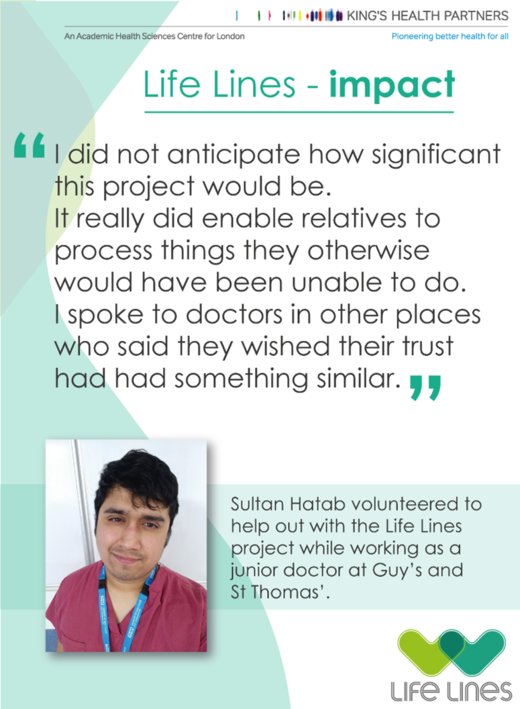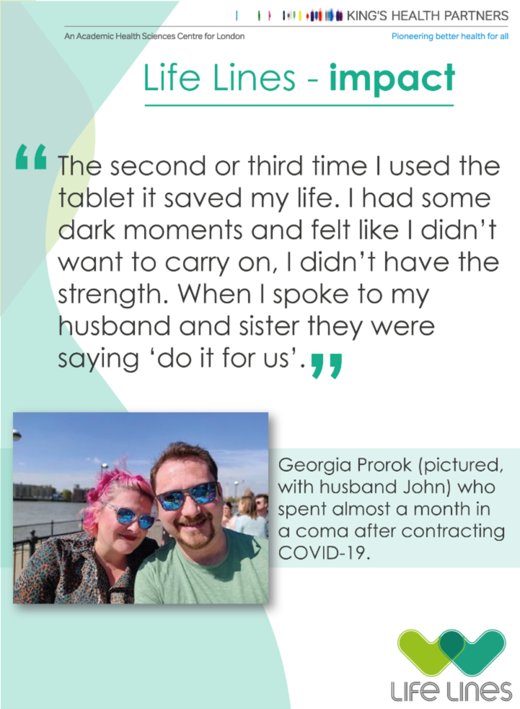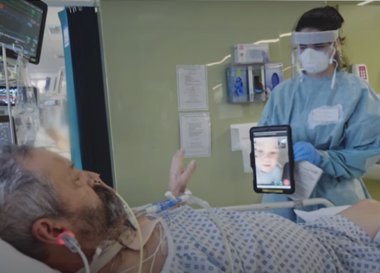30 March 2022
As our pioneering Life Lines project reaches its second birthday, King’s Health Partners spoke to co-founder Prof Louise Rose about the profound impact it has had throughout COVID-19 pandemic and what’s in store for its next phase.
Life Lines was set up at the start of the COVID-19 pandemic to connect families of critically ill patients who were isolated due to visiting restrictions in hospitals. The project provides Android tablets and secure online platform aTouchAwayTM, supported with 4G connectivity, to NHS hospitals. Families are able to meet the clinical teams to ask questions and then connect with their loved ones via the tablets in a secure, safe and dignified environment.
The Life Lines initiative was developed by Prof Louise Rose*, Dr Joel Meyer and Michel Paquet working with a team including clinical, academic, charitable and industry partners. King’s Health Partners (KHP) became the host institution for the project on 30 March 2020.
To mark the two-year anniversary of KHP’s involvement, we caught up with Prof Rose to discuss the profound impact of Life Lines, the benefits of partnership working, and the plans for the future.
When you launched Life Lines in March 2020, did you ever imagine the impact it would have? How long did you envision it running?
When we launched in March 2020 we had no idea that we would still be doing it two years later. It really was planned as an in the moment, rapid response to the visiting restrictions that COVID-19 had caused within the hospitals, so we really had no long-term vision.
Joel and I both work in different jobs – I’m a research professor, and he works as an ICU consultant. We would never have planned to have a two-year add-on career of running Life Lines and supporting hospitals with managing virtual visiting, and all the other things that help us support ICU patients and families in their recovery.
How do you feel when you read some of the incredible feedback from patients and families who have used the Life Lines service?
We've obviously had quite a lot of feedback from patients and families, both informally within the hospitals and within contacts, and also formally within my research programme.
Once I returned to my normal job I set up a research programme and we've interviewed more than 40 family members about virtual visiting and so forth.
It’s exceptionally rewarding and heart-warming to hear the feedback that they give us.
When we called it Life Lines I was a bit, ‘do we want to call it Life Lines?’, but so many family members have said to me that it was a lifeline, and I don't think they even realised that they’re saying it. It's often mentioned in our interviews that it was it was such a lifeline for them.

And it's so good to hear those stories and know that we made such an impact, and on such a scale as well. Because obviously, when we first started, we were doing it locally within our own hospital.
And then we thought we could help our friends in south London and then a bit more of London. And then it went viral, so to speak, and some went across the country.
It's been great that we've been able to help thousands of families and patients, and not just a smaller number within our local catchment area.
Life Lines is a great example of cross-partnership work throughout KHP. In what ways did being in the partnership help set up and develop the project?
Being adopted into the KHP portfolio saved our lives, in a way, because we were doing it all ourselves and working crazy hours, like 14, 16-hour days. We really needed project management help and support.
And so being adopted by KHP and having Joe Casey (Director of Partnerships and Programmes at KHP) come along and help us with the project management was absolutely instrumental in our success.
I think we would have never been able to achieve both the breadth of what we did but also sustaining it over time. Also the small things, or big things in reality, in terms of the connections and the doors that it opened, and the publicity and so forth. It was the machine of KHP that has really helped Life Lines along the way.

Tell us about the new areas that Life Lines is expanding into? What will it mean for patients and staff, and what they may experience?
Now at the two-year mark we're seeing visiting restored into hospitals, though obviously the COVID-19 case rates are going up again. But generally we're hoping that we won't have to continue with a pandemic-related response.
But I think what we've learnt with all our virtual visiting work is that it offers opportunities for patients and families that are additive to the in-person visiting. There have always been family members that can't physically be present in the hospital in the intensive care unit because they live in different countries or cities, or are unwell themselves and so forth.
So virtual visiting offers that additional accessibility into intensive care which is so essential for family members. They're having to go into the hospital every day and spend all that time there, it's not feasible when you have to work and you've got young kids, and all that sort of stuff. It offers that flexibility and accessibility.
And the other thing that we really learnt from our virtual visiting, and it's one thing that in-person visiting cannot do for you, is it can virtually take the patient home. So the patient is seeing their own kitchen and their pets and their grandchildren and so forth. That is really helpful for patients in terms of recovery.
We're hoping to continue to support some of our centres to really ensure that virtual visiting remains an option for family members and is not just taken away because in-person visiting is restored.
We’ve also, within the aTouchAway platform that we use for virtual visiting, developed an ICU e-diary. Diaries have been used in ICU as a way to maintain a record of what's gone on that's written in diary-style by the staff or family members.
But again, with the pandemic, the paper diaries we had previously were taken away. So we've developed an electronic version which the staff enter into, and then families have their own account and can also enter into it from their own home.
We've launched that across St Thomas’ Hospital and we're now looking to expand that opportunity for other sites.

The other big piece of work that we've been doing is we developed a digital ICU recovery pathway.
So again, using the platform and funded by Guy’s and St Thomas’ Charity, we've developed this pathway that works with patients in the recovery from intensive care and critical illness.
We have a dedicated ICU recovery co-ordinator and they work together and use the pathway to set recovery goals and determine recovery barriers.
It provides resources on common issues that are faced with ICU recovery such as fatigue and breathlessness, and the limited ability to even dress and wash yourself at the beginning. Some of our patients are extremely debilitated.
And so the pathway takes them through this sort of iterative goal setting. It links with their recovery co-ordinator and really fills the three months when patients get home and are still often quite impaired, until they come back to our recovery clinic at three months.
What we're seeing now is that the pathway is really helping get people referred to the right services, support their recovery, and understand what's going on. Often people get home and they go, ‘why can't I walk up my stairs or I feel exhausted or I can't move my arm and reach behind my back any more’. So it really helps them understand that.
We’ve had 50 patients on or through the pathway now, and it has recorded all their recovery goal setting and achievements. They can now look back and go, ‘oh wow, when I was first put on the pathway I couldn't brush my teeth and now I'm going back to work’. It's really helpful for them to understand their journey and does in itself help with their recovery.
So that's a big piece of work that we're doing. It's based in clinical services at Guy’s and St Thomas’ NHS Foundation Trust and we're talking to other centres with the hope of expanding it.
You can watch the full interview with Prof Rose below:
*Prof Louise Rose is a Professor of Critical Care Nursing at King’s College London.





